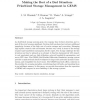Free Online Productivity Tools
i2Speak
i2Symbol
i2OCR
iTex2Img
iWeb2Print
iWeb2Shot
i2Type
iPdf2Split
iPdf2Merge
i2Bopomofo
i2Arabic
i2Style
i2Image
i2PDF
iLatex2Rtf
Sci2ools
103
click to vote
FGCS
2008
2008
Making the best of a bad situation: Prioritized storage management in GEMS
As distributed storage systems grow, the response time between detection and repair of the error becomes significant. Systems built on shared servers have additional complexity because of the high rate of service outages and revocation. Managing high replica counts in this environment becomes very costly in terms of the storage required and bandwidth consumption for file copies. The storage challenge for this situation can thus be phrased as an attempt to function inexpensively with respect to cost constraints such as: disk utilization, network bandwidth consumption, and server CPU time. The GEMS (Grid Enabled Molecular Simulation) storage system provides a replicated and shared workspace for large scale molecular dynamics simulations, and exemplifies the above issues. The GEMS framework offers a solution to this problem by accessing metadata, prioritizing observed faults, and repairing them in an intelligent manner. In this paper, we provide observations from the operation of GEMS an...
| Added | 10 Dec 2010 |
| Updated | 10 Dec 2010 |
| Type | Journal |
| Year | 2008 |
| Where | FGCS |
| Authors | Justin M. Wozniak, Paul Brenner, Douglas Thain, Aaron Striegel, Jesús A. Izaguirre |
Comments (0)

